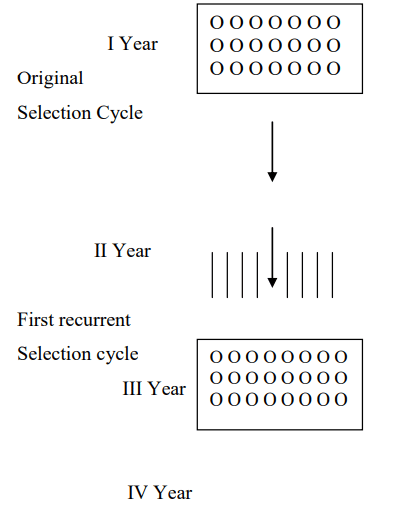Mass and Recurrent Selections, Combining Ability - 3 | Agriculture Optional for UPSC PDF Download
Recurrent Selection
Recurrent selection is a breeding method employed for the enhancement of cross-pollinated crops. In this approach, individual plants are chosen based on their observable characteristics or through progeny testing. These selected individual plants are then subjected to self-pollination. In the subsequent generation, they are intercrossed, meaning they are crossed in all possible combinations to produce a population for the next round of selection.
Recurrent selection programs are essentially modified versions of progeny selection programs. The key distinctions between progeny selection and recurrent selection are as follows:
- Method of Obtaining Progenies for Evaluation: In recurrent selection, the way progenies are obtained for evaluation differs from that in progeny selection.
- Inter-Crossing Among Selected Lines: In recurrent selection, instead of open pollination, all possible intercrosses are made among the selected lines.
Recurrent selection programs can be categorized into four different types, with the first type being:
1. Simple Recurrent Selection
- In this method, a number of desirable plants are selected and subjected to self-pollination. Subsequently, separate progeny rows are grown from the selected plants in the next generation. The progenies are intercrossed in all possible combinations through manual intervention.
- An equal quantity of seeds from each cross is combined to raise the next generation. This process completes the original selection cycle. From this new generation, several desirable plants are chosen and self-pollinated. Progeny rows are grown, and intercrosses are made. An equal amount of seeds are composited to raise the next generation, forming the first recurrent selection cycle.

Recurrent Selection for General Combining Ability (RSGCA):
RSGCA is a breeding method aimed at enhancing the general combining ability (GCA) of selected plants in a population.
This approach involves several steps:
- Several superior plants are initially selected.
- The selected plants are self-pollinated.
- The seeds from self-pollinated plants are evaluated, and superior plants are identified.
- Progeny rows are raised from the superior plants.
- All possible intercrosses are manually made among the progeny rows.
- Equal amounts of seeds are bulked from each cross.
- The composited seeds are raised in the next generation, and the process is repeated as in the first year.
The progenies selected for progeny testing are obtained by crossing the selected plants with a tester parent that has a broad genetic base. A tester parent is a common parent mated to multiple lines to estimate the combining ability of the selected lines. A tester with a broad genetic base can be an open-pollinated variety, a synthetic variety, or a segregating generation of a multiple cross.
RSGCA serves two main purposes:
- It can be used to enhance the yielding ability and agronomic characteristics of a population, resulting in a synthetic variety.
- It can be employed to concentrate genes for superior GCA, leading to the development of superior inbred lines. These inbred lines can be developed after a few cycles of RSGCA.
Recurrent Selection for Specific Combining Ability (RSSCA):
- RSSCA is similar to RSGCA but uses an inbred as a tester instead of an open-pollinated variety. The objective of RSSCA is to isolate lines within a population that combine well with a specific inbred. These lines are expected to produce the best hybrids in heterosis breeding.
Reciprocal Recurrent Selection
Proposed by Comstock, Robinson, and Harvey, this method aims to improve two different populations in their ability to combine well with each other. In this approach, two populations, denoted as A and B, are used, with each serving as a tester for the other.
The process includes several steps conducted over several years:
- Several plants are selected in populations A and B.
- The selected plants are self-pollinated.
- Selected plants from A are test-crossed with plants in B, and vice versa. Plants from these crosses are harvested based on single-plant (S.P.) basis.
- Separate yield trials are conducted from the test-cross progenies of A and B, and superior progenies are identified.
- Selfed seeds from plants producing superior test-cross progenies are planted.
- All possible intercrosses are made, seeds are harvested and composited.
- The process is repeated over subsequent years.
The use of reciprocal recurrent selection can lead to the development of two populations, which can then be intermated to create a superior population with a broad genetic base. In addition, inbreds can be developed from populations A and B, which can be crossed to produce single- or double-cross hybrids.
Use of RRS
- Two populations are developed by this method
- They may be intermated to produce a superior population with broad genetic base. This is similar to a varietal cross but in this case the populations have been subjected to selection for combining ability (GCA and SCA)
- Inbreds may be developed from populations A and B. These inbreds may be crossed to produce a single cross or double cross hybrids.
|
52 videos|224 docs
|





















